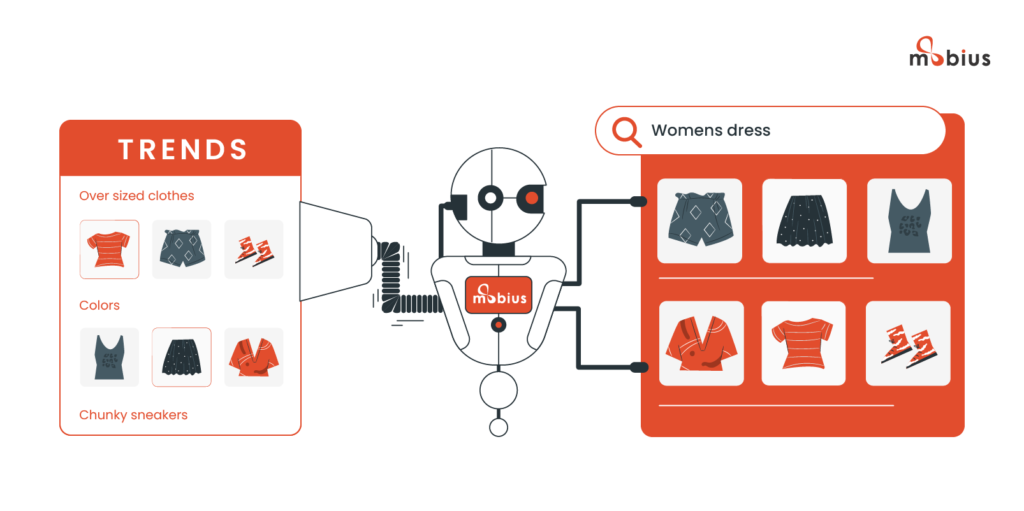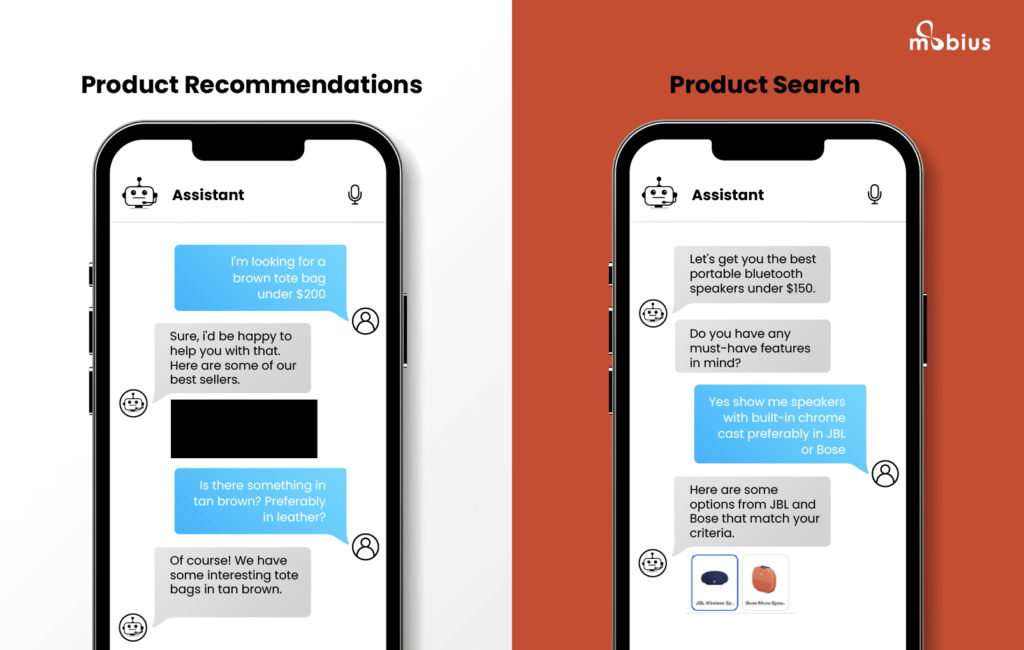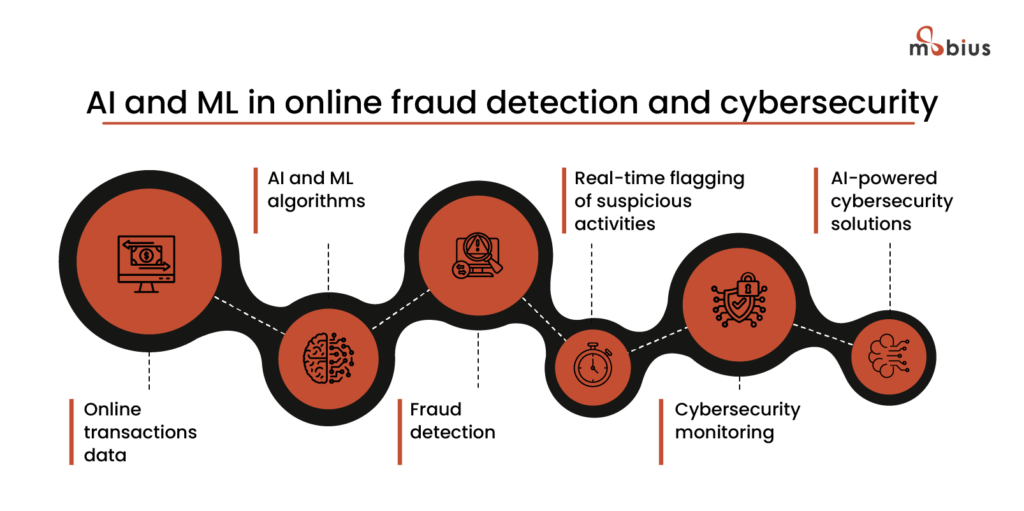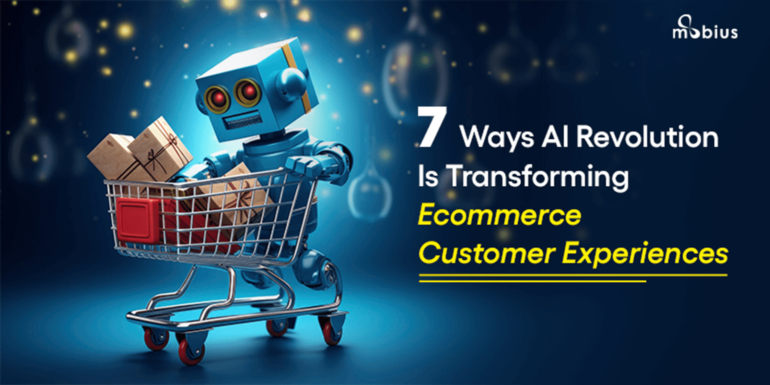Welcome to the era of the AI revolution, where Artificial Intelligence (AI) is not just a technological marvel but a driving force behind the evolution of business strategies.
Over 50% of ecommerce businesses have adopted AI technologies to enhance their operations.
Beyond its role in recommendation engines and automated support, AI in ecommerce is redefining the essence of customer interaction by predicting future trends, automating repetitive tasks, and fostering a more personalized connection between brands and consumers.
This blog explores seven powerful ways AI is redefining the ecommerce landscape, improving customer experiences, and propelling ecommerce businesses toward unprecedented growth. Let’s uncover the transformative impact of AI in customer experience journeys.
Understanding AI
Artificial Intelligence is no longer confined to science fiction from decades ago. Instead, it has seamlessly integrated into our reality, becoming an important part of our lives. From serving as search assistants in our phones to optimizing convenience through automation in smart home devices, AI is now a pervasive and transformative force.
If we talk about the commercial sector, AI has brought simplicity and precision to the way businesses work. From automating tasks to enhancing operational efficiency and providing valuable insights through data analysis, AI is transforming various aspects of business operations.
Its impact is evident in streamlining processes, improving decision-making, and bolstering cybersecurity. As businesses increasingly leverage AI-driven tools for tasks ranging from human resources to predictive maintenance, the commercial sector continues to evolve, embracing innovative solutions to meet the demands of a dynamic market landscape.
Role of AI Revolution in Transforming Ecommerce Customer Experiences
As we delve into the seven key ways AI is reshaping the ecommerce customer experience, it becomes clear that this technological evolution is not just a trend but a fundamental shift toward a more intelligent and responsive online retail environment.
1. Personalized Recommendations
AI-driven recommendations contribute to a 15-20% increase in conversion rates. AI-driven algorithms analyze user preferences, behavior and historical data to help offer personalized product recommendations, enhancing the overall shopping experience of your shoppers.

Amazon’s recommendation engine is one of the most well-known examples. It employs AI algorithms to assess the browsing and buying history of shoppers, along with the behavior of similar customers. The platform provides personalized product recommendations on the homepage, through emails, and during checkout.
2. Dynamic Pricing Strategies
AI enables ecommerce platforms to implement dynamic pricing based on demand, seasonality, and competitor pricing, ensuring competitive and optimized pricing strategies.
Many ecommerce players use dynamic pricing to stay competitive and win sales. AI-integrated pricing intelligence enables them to adjust product prices in response to real-time market conditions and changes. Your business can attract more customers and drive conversions by adopting an automated pricing strategy.
3. Efficient Chatbot Support
AI-powered chatbots provide 24/7 customer support, address queries, assist with purchases, and offer seamless interaction. Unlike traditional customer support channels with limited operating hours, AI in ecommerce has significantly enhanced customer satisfaction by providing immediate responses and assistance at any hour.

4. Predictive Analytics for Trend Forecasting
Predictive analytics widely aids in enhancing ecommerce customer experience. It is driven by ML algorithms and empowers businesses to anticipate market trends proactively.

Solutions like competitive intelligence help identify and process extensive datasets. They leverage advanced algorithms to extract crucial insights that enable ecommerce businesses to make informed decisions. This predictive capability aids businesses in reshaping their inventory management, refining marketing strategies, and optimizing product offerings to align with anticipated market shifts.
5. Enhanced Navigation with Virtual Assistants
Virtual assistants in ecommerce enhance the customer experience by providing personalized and intuitive support. These intelligent virtual assistants leverage AI to analyze user behavior and preferences and understand individual needs to simplify navigation.

Moreover, virtual assistants reduce bounce rates and increase conversion rates by facilitating quicker and more informed decision-making.
6. Fraud Prevention and Security
AI algorithms contribute to robust fraud detection systems, ensuring secure transactions and protecting businesses and customers from potential online threats. They analyze data in real-time to detect anomalies suggestive of any threats. By continuously learning and adapting, AI-powered fraud detection systems offer a proactive approach to cybersecurity, providing businesses with the tools to thwart evolving online threats.

7. Augmented Reality for Virtual Try-Ons
The integration of AI with augmented reality (AR) represents a groundbreaking advancement in online shopping, particularly through the implementation of virtual try-ons. This innovative technology transcends traditional limitations by offering customers a dynamic and interactive way to experience products remotely.

It has transformed how customers shop through immersive experiences that enable them to visualize and engage with products before making purchase decisions. Therefore improving the customer experience and fostering better engagement.
Summing Up
The AI revolution is transforming ecommerce customer experiences through personalized interactions, dynamic strategies, efficient support, trend predictions, enhanced navigation, robust security measures, and innovative augmented reality applications. These advancements collectively contribute to a more intelligent, responsive, and customer-centric online retail environment.
Leverage AI-driven tools in your ecommerce operations to streamline processes, improve decision-making, and ultimately create a more customer-centric and secure ecommerce landscape. The future of online shopping is undeniably shaped by artificial intelligence. Connect with us to understand how you can implement powerful tools and solutions in different areas of your business for growth.






